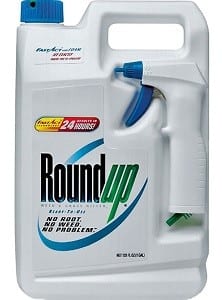 Roundup lawsuits naming Monsanto as the defendant are being filed across the country because Roundup and non-Hodgkin’s Lymphoma have been linked in several studies. Farmers, farm workers, landscape professionals, and even homeowners who tend their own lawns have all filed lawsuits alleging Roundup exposure caused them to develop non-Hodgkin’s Lymphoma (NHL), Chronic Lymphocytic Leukemia (CLL), or B-Cell Lymphoma.
Roundup lawsuits naming Monsanto as the defendant are being filed across the country because Roundup and non-Hodgkin’s Lymphoma have been linked in several studies. Farmers, farm workers, landscape professionals, and even homeowners who tend their own lawns have all filed lawsuits alleging Roundup exposure caused them to develop non-Hodgkin’s Lymphoma (NHL), Chronic Lymphocytic Leukemia (CLL), or B-Cell Lymphoma.Glyphosate a Probable Carcinogen
Monsanto lawsuits over Roundup were spurred on by a 2015 finding by the International Agency on Cancer Research (IARC) that glyphosate was probably carcinogenic to humans. That finding has been disputed by Monsanto, but lawsuits filed over Roundup have focused less on glyphosate than on the complete chemical formulation, which they claim can, interacting together, cause cancer.
Roundup under the Radar?
Plaintiffs suing Monsanto over Roundup allege that the popular herbicide has escaped careful scrutiny over the years by scientific sleight of hand. Most safety studies of Roundup have focused solely on its single named active ingredient, glyphosate. The problem, say the plaintiffs, is that glyphosate does not exist in a vacuum; and it is never applied alone. Glyphosate is just one of many adjuvants, or additives, included in Roundup, making it a far more toxic cocktail than glyphosate alone. In addition, many of Roundup’s ingredients are hidden under the auspices of proprietary privilege, so we’re not allowed to know exactly what chemicals are being applied to our land and food. Studies which have focused on the entire Roundup formulations, the parts which Monsanto has revealed – additives and all – have usually found very different results than studies focused only on glyphosate.
Roundup’s Mechanism of Action
Glyphosate (N-phosoponemethyl)glycine), the active component named in Roundup is a broad-spectrum systemic herbicide. Roundup is used to kill weeds, especially annual broadleaf weeds. Glyphosate is not applied alone but with “declared active ingredients” (dAIs). Other substances (co-formulants) are added to the final product, in order to modify the physico-chemical properties or to improve penetration into the plants or stability of the dAIs in the final product of the dAIs.
Roundup, Lymphoma Linked in Several Studies
NHL is a cancer that grows in white blood cells called lymphocytes, which help prevent infections and are part of the body’s immune system. Three major studies published since 2001 have linked Roundup to non-Hodgkin lymphoma. Other studies published since the 1970s have found convincing evidence that Roundup causes cancer in rodents and has genotoxic effects in humans.
1. A 2001 study published by McDuffie et al. found higher exposures to Roundup were associated with higher rates of non-Hodgkin lymphoma. They conducted a Canadian multicenter population-based incident, case (n = 517 people with NHL)-control (n = 1506) study among men in a diversity of occupations using an initial postal questionnaire followed by a telephone interview for those reporting pesticide exposure of 10 h/year or more, and a 15% random sample of the remainder.
McDuffie concluded that NHL was associated with specific pesticides after adjustment for other independent predictors. Glyphosate was not significant for exposure (due to low use reporting) but demonstrated a dose-response relationship to NHL.
2. A study published by DeRoos in 2003 used pooled data from three case-control studies of NHL conducted by the National Cancer Institute in the midwestern U.S. The pooled data were used to examine pesticide exposures in farming as risk factors for NHL in men. A large sample size (3,417) allowed analysis of 47 different pesticides simultaneously, with appropriate controls to differentiate pesticides. Glyphosate exposure showed a statistically significant link to NHL in the study.
3. Eriksson et al 2008 reported a population based case-control study of exposure to pesticides as risk factor for non-Hodgkin lymphoma. Men and women aged 18-74 living in Sweden from Dec. 1999 to April 2002 were included. In total, 910 cases of NHL and 1016 controls participated. Eriksson concluded there was an association between exposure to phenoxyacetic acids and NHL and the association with glyphosate was considerably strengthened. Unspecified NHL was significantly associated with glyphosate.
4. Shinasi et al 2014 looked at exposure to agricultural pesticide chemical groups and active ingredients. They found in some studies an association between pesticides and non-Hodgkin’s lymphoma NHL subtypes. Large B-cell lymphoma was positively associated with phenoxy herbicides and the organophosphorus herbicide glyphosate.
Regulatory Assessment
Breaking with the IARC’s pronouncement that glyphosate is a probable human carcinogen, the European Food Safety Authority (EFSA 2015) concluded that the active ingredient in Roundup (glyophosate) was “unlikely to pose a carcinogenic hazard to humans.” The discrepancy may be explained by the fact that the EFSA report included only studies looking at glyphosate alone. A 2016 article published by 94 environmental health experts added that IARC considered only independent studies, while EFSA included data from unpublished industry-submitted studies, which were cited with redacted footnotes.
In response to queries, an EPA spokesperson claimed that “the safety of all inert ingredients are considered” during the pesticide registration process, though an 87-page “Cancer Assessment Document,” which was among the documents accidentally released, contains no references to research conducted on the co-formulants.
Related
- Roundup Lymphoma Lawsuit Filed
- Monsanto Lawsuit | Lawyer

by Matthews & Associates




